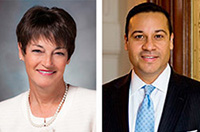By Ken Camp
Baptists helped craft the Religious Freedom Restoration Act at the national level and secured its passage at the state level in Texas. But some Texas Baptists are leery of language in a proposed RFRA-based state constitutional amendment.
The efforts in the Lone Star state come as Georgia, North Carolina and Michigan see RFRA measures being considered — some of them with much contention.
The Baptist Joint Committee for Religious Liberty helped create a broadly based coalition that led to passage of the federal Religious Freedom Restoration Act of 1993. After the Supreme Court ruled in 1997 that RFRA applies only at the national level, the Texas Baptist Christian Life Commission played a key role in guiding a state version of RFRA into law.
Both the state and national versions of RFRA say, “Government shall not substantially burden a person’s exercise of religion even if the burden results from a rule of general applicability.” An exception is if that burden is necessary to further a compelling government interest and provided it uses the least restrictive means to further that interest.
Last fall, three Texas Baptist pastors — Kyle Henderson from First Baptist Church in Athens, Brent Gentzel from First Baptist Church in Kaufman and Kris Segrest from First Baptist Church in Wylie — urged fellow church leaders to support a call to amend the state constitution to include language modeled after RFRA.
Adding RFRA-based protections to Article 1, Section 6 of the Texas Constitution’s Bill of Rights would raise the threshold, so any state legislative session could not overturn it, they told a group of pastors who met in Waco on the eve of the Baptist General Convention of Texas annual meeting last fall.
 A Texas state senator and a state representative have filed similar — though not identical — bills in the Texas Legislature regarding a constitutional amendment on religious freedom.
A Texas state senator and a state representative have filed similar — though not identical — bills in the Texas Legislature regarding a constitutional amendment on religious freedom.
Sen. Donna Campbell, R-New Braunfels, introduced Senate Joint Resolution 10. The resolution, which proposes a constitutional amendment, prohibits government from infringing on an individual’s or religious group’s right to act or refuse to act in a manner motivated by religious belief.
State Rep. Jason Villabla, R-Dallas, introduced House Joint Resolution 55, which contains slightly different language barring government from burdening “in any way a person’s free exercise of religion.” Villabla’s version also includes language that specifically singles out homeowners’ associations.
Both measures have one thing in common: They lower the threshold from “substantially burden” to “burden.” And the distinction between “burden” and “substantially burden” means the difference between an inconvenience that invites litigation and a significant infringement on free exercise of faith, a Texas Baptist attorney and public policy expert said.
“The Christian Life Commission helped develop the Religious Freedom Restoration Act that is now law in Texas, and we support moving the current RFRA statute into the Texas constitution,” said Kathryn Freeman, CLC director of public policy.
Original language
 “Our desire is to help influence this legislation in a manner that protects the rights of all Texans to practice their religion responsibly without government interference. As a result, it is important that we keep the current RFRA language intact,” she said.
“Our desire is to help influence this legislation in a manner that protects the rights of all Texans to practice their religion responsibly without government interference. As a result, it is important that we keep the current RFRA language intact,” she said.
As originally drafted, RFRA maintains the proper balance between the free exercise of religion and no government establishment of religion, she said, as well as a balance between individual rights and state interests.
For instance, RFRA provided sufficient protection for an Orthodox Jewish synagogue that meets regularly in the living room of a North Dallas homeowner, she noted. A judge dismissed a lawsuit against Congregation Toras Chaim brought by some neighbors who claimed the religious services violated deed restrictions of the property owner’s association.
“The Dallas case involving the Orthodox Jewish congregation demonstrates the ‘substantially burden’ test is not too high a threshold to provide protection,” Freeman said.
Henderson likewise voiced support for a state constitutional amendment that adheres strictly to the language of RFRA as passed in 1993.
“The closer it is to the national law, the more likely it is to pass constitutional muster,” he said. “We need to do this together. The original law passed with broadly based support, and the state constitutional amendment needs to be similarly broad-based in its appeal.”
‘Burden’ vs. ‘substantially burden’
Some supporters of the proposed constitutional amendment — who want “substantially burden” changed to “burden” — cite a range of national issues regarding the religious rights of business owners, ranging from the contraceptive mandate in the Affordable Care Act to whether bakers and florists should be compelled to offer their services for same-sex weddings.
Freeman underscored the proven effectiveness of RFRA as it stands and suggested a need to “keep the long view” in regard to protecting religious liberty rather than react to issues of the moment.
“Religious liberty is a bedrock principle of Baptists and of the United States. It impacts many issues but should not be a tool used to forward any one political agenda,” Freeman said.
